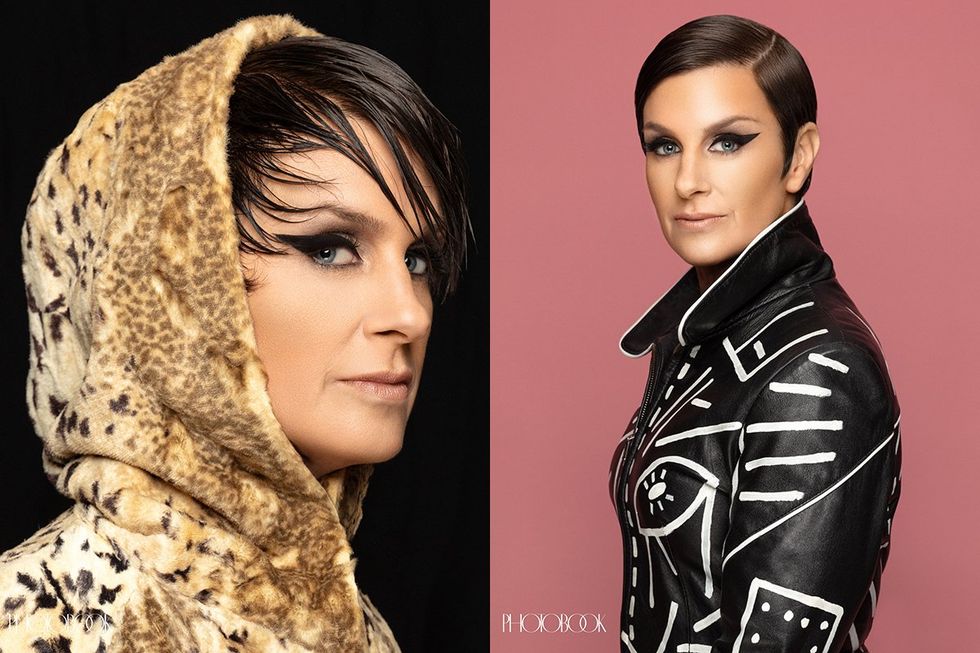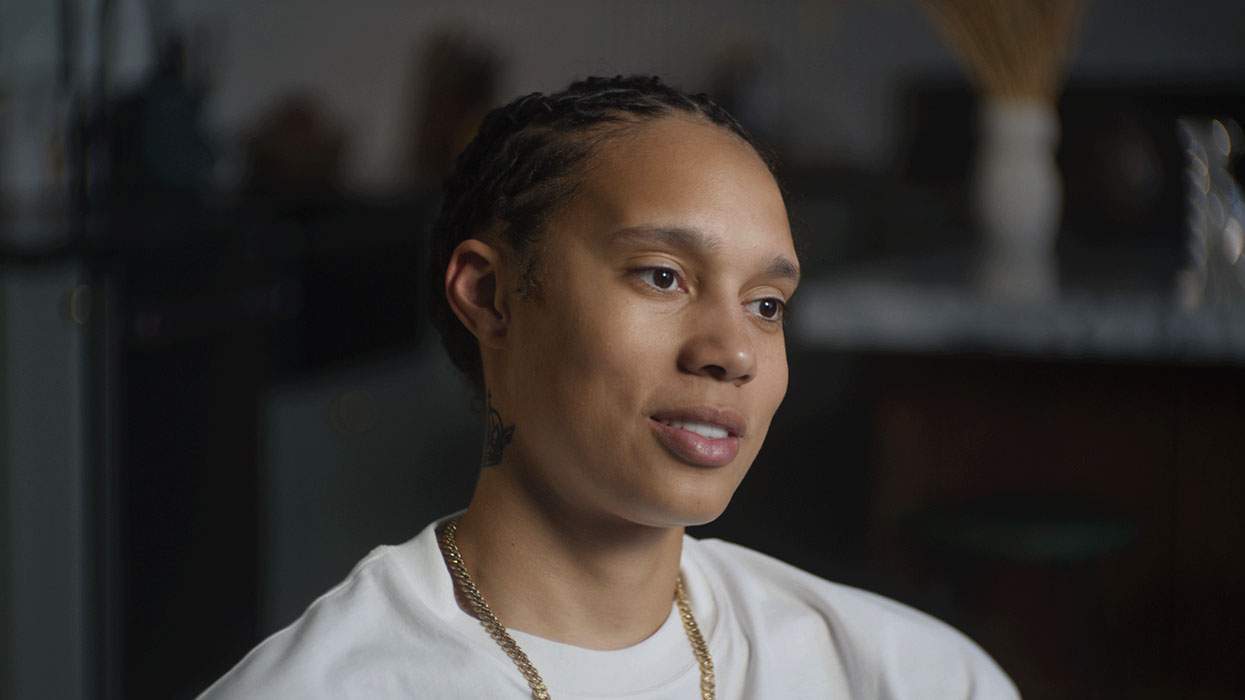There’s a brightness in Tracy Young’s voice these days — a kind of quiet exultation — that seems to carry over every syllable, even when she’s recalling the darkest chapters of her life. “I’m glowing,” she admits with a laugh, a confession of joy that’s as vulnerable as anything she’s said. “I’m just — I never in a million years thought I would be happy again.”
Keep up with the latest in LGBTQ+ news and politics. Sign up for The Advocate's email newsletter.
At 54, the Grammy-winning DJ, music producer, and FEROSH Records label head finds herself at an unexpected high point precisely because she’s come through valleys that nearly swallowed her whole. In a deeply personal interview with The Advocate, Young spoke candidly about grief, reinvention, sobriety, and the transformative power of music that saved her again and again.
A few years ago, Young’s world seemed poised at the pinnacle. In 2020, she won a historic Grammy for her remix of Madonna’s “I Rise,” becoming the first woman to win the award for Best Remixed Recording, Non-Classical. And then, as she recalls, “COVID happened. And then my mom had a second fire.”
Related: The history of the circuit party: Transforming LGBTQ+ political pain into power
The events snowballed into tragedy. Young moved her mother from Pennsylvania to a new apartment after the fire. Not long after, her stepfather died suddenly in front of her mother, and then Young’s mother passed away in her sleep. “It’ll be four years in February,” she says softly. “So it’s about three and a half years, I mean, not even.”
Her mom had been her “biggest fan,” and her loss left a silence Young wasn’t sure she could fill. “I was so depressed,” she admits. “I just thought … I don’t know. It’s the craziest thing. I never thought I’d be happy again.”
It was music, and a bit of divine timing, that offered her a lifeline.
“I was at Pride last year in D.C., and I got a call,” Young recalls. She’d initially reached out to Cyndi Lauper’s team about DJing after-parties for Lauper’s upcoming farewell tour. “I was never thinking the whole tour.”
But soon, Young was invited not just for Lauper’s European stadium tour in February, but for the entire summer North American run of Lauper’s Girls Just Wanna Have Fun Farewell Tour, which spans stadiums and amphitheaters coast to coast in July and August.
For Young, an out lesbian, this is a deeply personal and professional full-circle moment. Her relationship with Lauper stretches back more than 20 years, beginning with her remix of Lauper’s “Shine.” It’s a friendship that’s included surprise performances, like Lauper showing up at Young’s birthday party at South Beach’s Level Nightclub in the early 2000s, and collaborations like the “Hope” project during the pandemic and a major New Year’s Eve performance in Times Square.
Related: Cyndi Lauper hailed as a pioneering activist for queer people in a new documentary
“Being asked to be part of Cyndi’s farewell tour felt like a sign from the universe,” Young says. “I was in a deep emotional place after losing my mom, and this opportunity reignited my spirit. It reminded me why I fell in love with music in the first place — connection, community, and joy.”
Young is the official pre-show DJ for the tour, tasked with electrifying thousands of fans each night before Lauper takes the stage. She’s crafting immersive, high-energy sets that span synth-pop, disco, house, new wave, and rare remixes, including some exclusive reworks of Lauper’s classics. Her sets are filled with custom intros, unreleased edits, and even city-specific surprises.
“It’s not a pre-programmed set,” Young explains. I do research on each city that we go to. I’ve always played live that way.”

Part of that rediscovery has come from looking inward. “I’m sober,” Young shares. “I was never a big party girl, but there was a moment there where I got a little off track.”
And in her grief, the physical toll was real. “I was about 50 pounds overweight,” she confesses. “I just started really getting back to me.” She credits Lauper not only for getting her back into music but also for inspiring her to reclaim her health. “Cyndi got me back in the gym. I wanted to lose weight, I wanted to look good, I wanted to have new music, and I wanted to be on top of it.”
She adds, “I hadn’t been doing anything. I was so depressed.”
Now her days include meditation, exercise, and a new sense of presence. “I’m remembering moments,” she says. “I’m very present. I’m clear.”
For Young, it’s about reclaiming joy she thought might be gone forever. “I’ve met some new people, and I’m happy in Miami, and I wasn’t always happy here,” she says. “I’m engaged in my life again.”
It’s easy to talk about Tracy Young in terms of milestones: playing the world’s biggest clubs, remixing legends like Madonna, Cyndi Lauper, and k.d. lang, or breaking barriers as a woman in a field still dominated by men. But behind the decks, she has always been about something more meaningful.
“I wanted to create memories for people,” she says. “Those moments where, oh, my God, do you remember that party? I wanted to blow people’s minds. And I never really wanted it to be about me.”
Related: Cyndi Lauper named Lifetime Ally Icon for WeHo Pride
She references her iconic remix of “Defying Gravity,” which found new life recently amid the buzz around the Wicked movie. “The label didn’t want to release it,” she recalls. “I played that in London one time, uploaded it to MySpace — it went viral, whatever viral was back then — and then they released it.” She grins at the memory. “The people spoke.”
Even after decades in the business, Young still finds delight in these unpredictable turns. “It’s like a brand new song again,” she says of the track’s resurgence on streaming platforms. Indeed, it’s now her biggest-streamed song on Spotify.
As the conversation drifts toward her family, Young grows more reflective. Her mother, she shares, struggled with mental illness, living with bipolar disorder. “I worried about her all the time,” Young says. “I’ve never had to just worry about myself. I was always worried.”
That lifelong vigilance has only recently lifted. “I go to bed not worried anymore,” she says. “And I don’t know if I did that for a while she was here.”
She hesitates. “I’d rather her be here than not. But there’s a weight that’s lifted in a way.”
That relief, however bittersweet, has given her a new outlook — and an artistic renaissance. “I’m in such a creative headspace right now,” she says. “I’m in it.”
As Lauper’s farewell tour winds through cities from Boston to Los Angeles — including stops at iconic venues like Hollywood Bowl and New York’s Jones Beach — Young takes nothing for granted. “This is about Cyndi and her legacy,” Young says. “I’m there to support and get the crowd ready for her.”
Lauper’s farewell run is more than a concert; it’s a cultural moment. Since launching in 2024, the tour has already helped raise nearly $150,000 for the Girls Just Want to Have Fundamental Rights Fund at the Tides Foundation, thanks to fan donations and campaign partnerships.
Meanwhile, Young is shaping her own next chapter through new music and the expansion of FEROSH Records. She’s releasing three major studio collaborations over the summer and fall: on July 25, she’ll debut “I Know You, I Live You,” featuring powerhouse vocalists Niki Haris and Donna De Lory; on August 22, she reunites with Janice Robinson for a soulful anthem titled “Divine Love Lives”; and on October 3, she’ll release “WATR,” another vibrant collaboration with Niki Haris and Donna De Lory timed to honor LGBTQ+ History Month.
And always, she remains devoted to the dance floor. “Dancing was always a part of how we as a community came together,” she says. “Whether it was HIV or trans rights or Pride, we celebrated and learned together on the dance floor.”
In early June, Young, who is originally from Northern Virginia, returned to Washington, D.C., for WorldPride, where she spun a closing open-air set on Pennsylvania Avenue in the shadow of the illuminated Capitol among a sea of tens of thousands of people celebrating the diversity of the LGBTQ+ experience.
Ultimately, that’s what Young hopes people will remember. “I want to be remembered for love,” she says. “For spreading joy. For creating moments where people can be free.”
















Charlie Kirk DID say stoning gay people was the 'perfect law' — and these other heinous quotes
These are some of his worst comments about LGBTQ+ people made by Charlie Kirk.